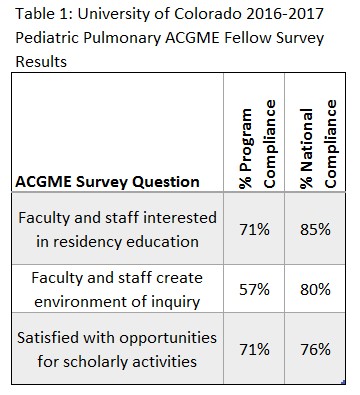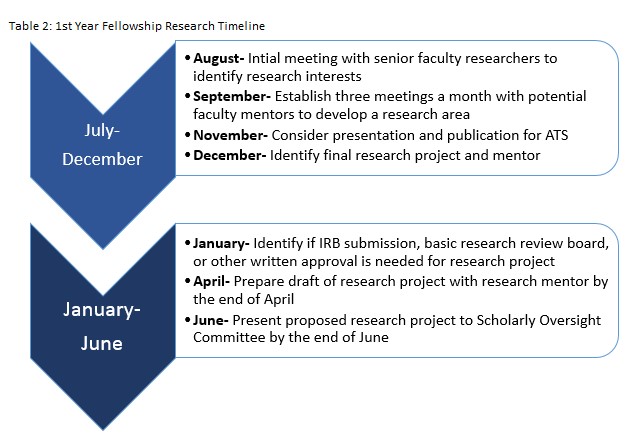University of Colorado
Aurora, CO
Program Director: Ricky Mohon
Program Type: Pediatric Pulmonary
Abstract Authors: Emily C Mitchell, MA Ricky T Mohon, MD
Description of Fellowship Program: The University of Colorado Pediatric Pulmonology Fellowship is one of the oldest and most respected programs in the United States and was accredited the first year ACGME began accreditation for these training programs. This three-year program accepts two fellows each year, and focuses on both clinical and research experiences that generate the knowledge, skill, and technical expertise necessary to become a superb academic pediatric pulmonologist.
Abstract
Background
Scholarly activity in pediatric fellowship training requires completion of a well-defined “work product” as outlined by the American Board of Pediatrics General Criteria for Subspecialty Certification. Accomplishing this minimal criterion may not adequately prepare the fellow as a future physician scientist. In addition, fellows often initiate their training program focused heavily on clinical work with little dedicated or structured time to develop the skills required for a successful career in research. Faculty research mentors may seem removed from the fellows, and perceived as too busy to begin exploring opportunities for research. Curriculum changes became necessary to correct these gaps and improve the training of our future physician scientists.
Objectives
The nidus for creation of our Fellowship Research Timeline originated from compliance data obtained in the University of Colorado Pulmonary Fellowship ACGME survey for the 2016-2017 academic year, Table 1. These perceived gaps were detected in our recent Accreditation Council for Graduate Medical Education (ACGME) 2016-2017 annual program survey completed by both the fellows and faculty. The program sought to improve engagement and accountability between the fellows and the faculty. Another goal was to work with fellows and faculty on the prioritization of fellowship research experience.
Methods
In order to obtain unbiased opinions from both fellows and faculty a third party consultant was retained to survey all fellows by their PGY level, and faculty by their academic level. Feedback were anonymously compiled and de-identified by the consultant. The feedback was distributed to department and fellowship leadership, who met to form initial recommendations based off the qualitative data. Some information was also given to a department research subcommittee, to begin drafting the Fellowship Research Timeline, Table 2.
Results/Outcomes/Improvements
Three main themes were identified from the consultant’s report: 1) fellows were not being connected to available research resources 2) faculty seemed distant and uninterested in fellowship initiatives and 3) each fellow had different levels of engagement with their research mentor. To address each of these themes, four new initiatives were undertaken to improve the fellowship curriculum and education, 1) creation of a master research project database to include a detailed list all current faculty research projects that a fellow can participate 2) formation of a Fellowship Advisory Team to pair fellows with a personal and professional mentor 3) creation of a roles and responsibilities template for fellow and mentor use and 4) development of Fellowship Research Timeline for fellows to plan research goals needing to be reached every 6 months of their fellowship program. Fellows meet with senior research faculty and the fellowship Program Director to receive guidance on implementing this timeline. Fellows have communicated higher satisfaction related to their educational experience and department support being provided to them. Since we had buy in from the beginning by all stakeholders, we anticipate marked improvement in the 2017-2018 Faculty and Resident Survey Results. We feel this curriculum will be sustainable into the future as we should have timely updates and ongoing meetings by the newly formed Fellowship Advisory Team.
Significance/Implications/Relevance
Fellowship communication and faculty engagement will always require ongoing oversight by fellowship leadership. The specific path for each new physician scientist will vary with each trainee based on career goals, but having a Fellowship Research Timeline will help ensure that fellows will be more successful and content with their training. The formation of the Fellowship Advisory Team will proactively work to meet a fellow’s specific educational needs and goals, while creating guidelines for fellow and faculty mentorship. This should ensure that faculty are engaging fellows in an appropriate and amicable manner that benefits their research development.





